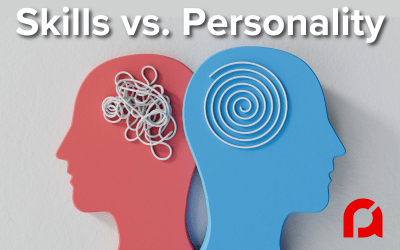Companies of all sizes often debate whether technical skills or personality traits matter more when screening job candidates. While technical skills can be taught, personality is inherent and predicts how a candidate will perform on the job. Further, research shows that skills alone are not enough. Without personality fit, a candidate may struggle despite having the right technical abilities.
In this post, we explain why personality can sometimes matter even more in candidate success and how to use personality assessments to build a stronger team. For details on our approach, refer to our Personal Style Inventory Technical Manual.
The Role of Personality in Job Performance
The American Psychological Association has many research studies which confirm that personality traits correlate with job performance. Personality traits such as conscientiousness, extroversion, and openness are just a few bevavioral attributes that are central to a candidate’s workplace behavior. These behaviors influence work habits, interpersonal relations, resilience and adaptability.
A candidate whose personality naturally fits a job role is more likely to thrive without excessive training. For example, a sales professional with high extroversion will have a higher chance of building strong client relationships.
Limitations of Skills Alone
Although essential for many roles, technical skills can become outdated. Further, skills tests measure current ability, but do not reveal how a candidate may behave on a daily basis. Without personality data, employers miss critical insights. A candidate might excel in a coding test yet struggle to collaborate with team members or manage stress. In modern hiring, skills alone do not guarantee long-term success.
The Benefits of a Personality-Driven Hiring Strategy
Hiring for personality fit sets the stage for sustainable success. When candidates naturally align with a role’s behavioral demands, they perform consistently over time. Personality assessments help identify whether a candidate possesses traits that match job requirements. For instance, a role requiring teamwork benefits from a candidate with high cooperation and empathy. Employers can use tools like our Big 5 personality assessments to gain a clear picture of a candidate’s natural tendencies. This approach supports hiring decisions that reduce turnover and improve performance.
Integrating Skills with Personality Insights
While technical skills are important, they work best when paired with the right personality traits. A balanced hiring strategy uses both skill tests and personality assessments. This dual approach provides a complete view of the candidate. It ensures that the technical know-how is supported by a fitting work style. According to a meta-analysis published in the Harvard Business Review, cognitive ability and personality traits predict job performance more reliably than technical skills alone.
Research Supporting Personality Fit
Several studies support the value of personality in predicting long-term performance. The American Psychological Association has found strong links between traits like conscientiousness and success on the job. The Society for Human Resource Management (SHRM) also reports that companies prioritizing personality fit enjoy lower turnover rates and higher employee engagement. These findings suggest that hiring with a focus on personality can yield a more resilient workforce.
A Balanced Approach is Best
In any job, technical skills are important, but they cannot replace the value of personality fit. A candidate’s inherent traits determine how well they adapt, collaborate, and grow within an organization. By using personality assessments alongside skills tests, employers can make smarter hiring decisions. This balanced approach creates teams that are not only technically competent but also naturally aligned with the company culture. To build a workforce that excels in the long term, focus on hiring for personality—and watch performance improve.



